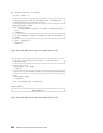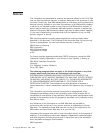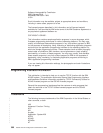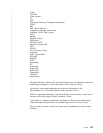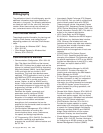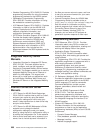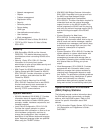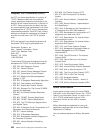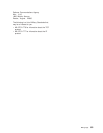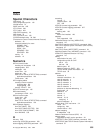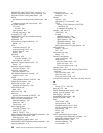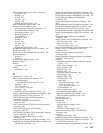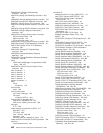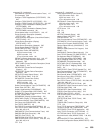
Request For Comments (RFC)
An RFC is a formal specification of a portion of
TCP/IP. Research ideas and new protocols
(mostly application protocols) are brought to the
attention of the Internet community in the form of
an RFC. Some protocols are so useful that they
are recommended to be implemented in all future
implementations of TCP/IP; that is, they become
recommended protocols. Each RFC has a status
attribute to indicate the acceptance and stage of
evolution this idea has in the TCP/IP protocol
suite.
RFCs are generally very detailed and technical
documents. RFCs may be purchased from:
Government Systems, Inc.
Attn: Network Information Center
14200 Park Meadow Drive
Suite 200
Chantilly, VA 22021
1-800-365-3642
The following RFCs were considered during the
development of TCP/IP for the AS/400 system:
v RFC 768,
User Datagram Protocol
v RFC 791,
Internet Protocol
v RFC 792,
Internet Control Message Protocol
v RFC 793,
Transmission Control Protocol
v RFC 813,
Window And Acknowledgement
Strategy In TCP
v RFC 815,
IP Datagram Reassembly Algorithms
v RFC 816,
Fault Isolation and Recovery
v RFC 821,
Simple Mail Transfer Protocol
v RFC 822,
Standard For The Format Of ARPA
Internet Text Messages
v RFC 826,
An Ethernet Address Resolution
Protocol
v RFC 854,
TELNET Protocol Specification
v RFC 855,
TELNET Option Specifications
v RFC 879,
The TCP Maximum Segment Size
and Related Topics
v RFC 894,
A Standard for the Transmission of IP
Datagrams over Ethernet Networks
v RFC 917,
Internet Subnets
v RFC 919,
IP Broadcast Datagrams
v RFC 922,
Broadcasting Internet Datagrams in
the Presence of Subnets
v RFC 950,
Internet Standard Subnetting
Procedure
v RFC 959,
File Transfer Protocol (FTP)
v RFC 974,
Mail Routing And The Domain
System
v RFC 1034,
Domain Names - Concepts And
Facilities
v RFC 1035,
Domain Names - Implementation
And Specification
v RFC 1042,
A Standard for the Transmission of
IP Datagrams over IEEE 802 Networks
v RFC 1055,
Nonstandard for transmission of IP
datagrams over serial lines: SLIP
v RFC 1122,
Requirements For Internet Hosts—
Communication Layers
v RFC 1123,
Requirements For Internet Hosts—
Application And Support
v RFC 1179,
Line Printer Daemon Protocol
v RFC 1213,
Management Information Base for
Network Management of TCP/IP-Based
Internets MIB-II
v RFC 1349,
Type Of Service In The Internet
Protocol Suite
v RFC 1349,
Type of Service in the Internet
Protocol Suite
v RFC 1572,
Telnet Environment Option
v RFC 1600,
Internet Official Protocol Standards
v RFC 1635,
How to Use Anonymous FTP
v RFC 1661,
The Point-to-Point Protocol (PPP)
v RFC 1662,
PPP in HDLC-like Framing
v RFC 1700,
Assigned Numbers
v RFC 1725,
Post Office Protocol - Version 3
v RFC 1738,
Uniform Resource Locators (URL)
Other Information
A good place to begin looking for online AS/400
information is the Information Center. See “TCP/IP
Topics in the Information Center” on page xv for a
list of TCP/IP-related topics that are in the
Information Center and the URL to access it
online.
Military Standards are approved for use by all
departments and agencies of the United States
Department of Defense.
You can address requests for Military Standards
to:
602 OS/400 TCP/IP Configuration and Reference V4R4
|
|
|
|
|
|



